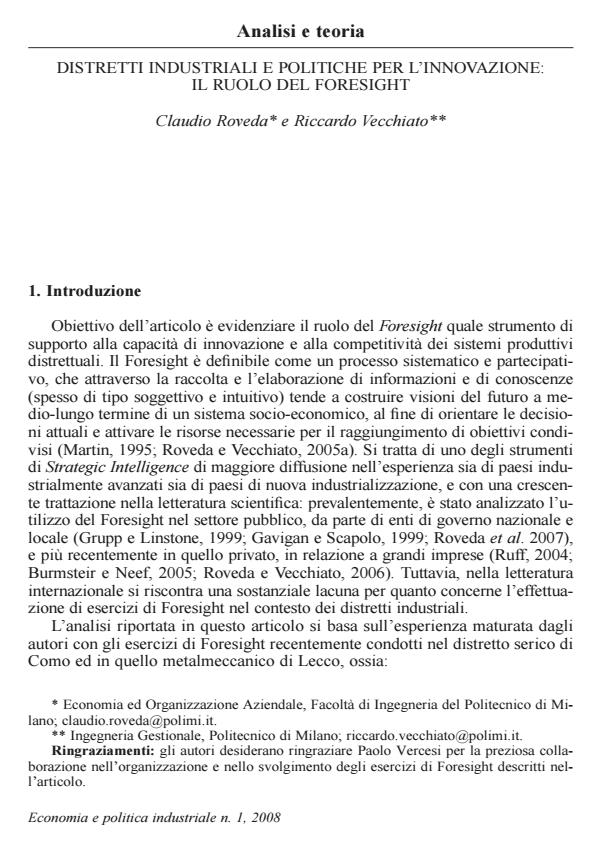Distretti industriali e politiche per l'innovazione: il ruolo del Foresight
Journal title ECONOMIA E POLITICA INDUSTRIALE
Author/s Claudio Roveda, Riccardo Vecchiato
Publishing Year 2008 Issue 2008/1
Language Italian Pages 20 P. 5-24 File size 95 KB
DOI
DOI is like a bar code for intellectual property: to have more infomation
click here
Below, you can see the article first page
If you want to buy this article in PDF format, you can do it, following the instructions to buy download credits

FrancoAngeli is member of Publishers International Linking Association, Inc (PILA), a not-for-profit association which run the CrossRef service enabling links to and from online scholarly content.
Distretti industriali e politiche per l'innovazione: il ruolo del Foresight - Industrial districts and innovation policies: the role of Foresight, by Claudio Roveda and Riccardo Vecchiato It is well recognised that innovation is a systemic process, which involves quite a number of actors with different capabilities, competencies and goals, operating at different levels: national, regional, local. In particular, the local level is receiving a growing attention, due to the fact that, on one hand, innovations tend to be concentrated in localized production systems (clusters) and, on the other hand, they tend to be specialised according to the features of the local systems. Many studies have pointed out that in a local system innovation is the output of exchange of formalised and not-formalised knowledge among various actors, which interact and cooperate on the basis of mutual trust and acceptance of shared values. These actors are basically firms, universities and public and private research centres, banks, trade associations, governmental bodies. Industrial districts are a clear example of the localised nature of innovation. Their economic system strongly interacts with the social system, from which it acquires manpower, know-how, physical and non-physical infrastructures, cultural va lues. These factors are fundamental in creating and disseminating innovations by means of the production of both explicit (or coded) and tacit (or contextual) knowledge and of its integration in a continuous process of socialization, articulation, combination and internalization. Our recent Foresight exercises on the engineering district of Lecco and in the silk district of Como show that Foresight can play an important role in creating and exploiting new knowledge: however, the Foresight methodology has to be properly chosen. Interactive workshops and experts panels, with the participation of entrepreneurs of SMEs and technologists, are more suited to foster incremental innovation, based on the transfer of technologies that have passed through the initial stage of their life cycle. On the other hand, to promote and to foster radical innovation other methodologies are needed, as Scenarios. They are definitely more complex, expansive and time consuming, as they require the wide participation and the active role of the different district stakeholders: firms, centres of research and technology transfer, local governmental bodies, trade associations. On the other hand, these methodologies allow an organic and comprehensive investigation of the economic, social and cultural dimensions of an industrial district, on a long term horizon, as an essential precondition for developing strategies and policies that are really effective with regard to the macro changes brought by the global competition. One of the main results of our empirical research studies, is that Foresight may facilitate the integration of small entrepreneurs, district stakeholders and medium and large companies, driving them to play the critical roles of "frontline employees", "senior managers" and "middle managers" that Nonaka and Takeuchi describe in their Knowledge creating company (1995): the first ones master what the district is; the second ones build the vision of what it ought to be; the third ones serve as a bridge. JEL Classification: O290, O330.
Claudio Roveda, Riccardo Vecchiato, Distretti industriali e politiche per l'innovazione: il ruolo del Foresight in "ECONOMIA E POLITICA INDUSTRIALE " 1/2008, pp 5-24, DOI: